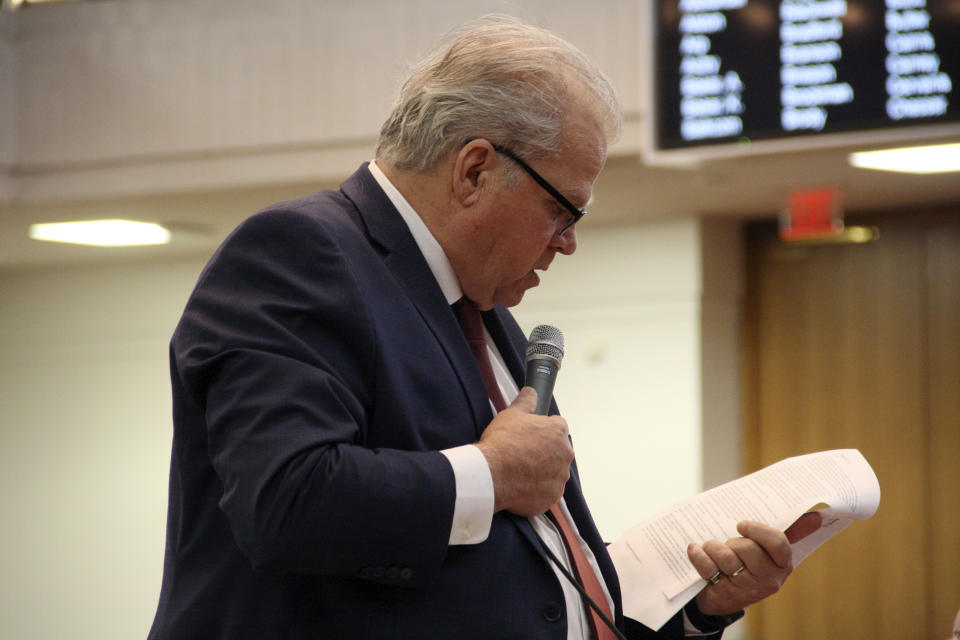North Carolina lawmakers approve mask bill that allows health exemption after pushback
RALEIGH, N.C. (AP) — A new, reworked version of a bill that originally caught flak for removing a pandemic-era health exemption for wearing a mask in public was approved by North Carolina lawmakers on Tuesday.
The amended bill still increases punishments for people wearing masks while committing a crime. It was brought forth in part as a response to campus protests on the war in Gaza. The previous version of the bill would have also barred masking in public for health reasons.
Following extended debate from Democrats, the General Assembly passed the measure in a 69-43 vote. The state Senate passed the compromise bill last week. It now heads to Democratic Gov. Roy Cooper's desk.
The legislation — which previously removed a 2020 exemption for wearing a mask in public for health purposes — moved swiftly through the Senate last month. But it halted in the House after Rep. Erin Pare, Wake County’s lone Republican General Assembly member, said she wouldn’t approve it because of the health exemption removal. Republicans have a narrow supermajority in the legislature that requires all party members to remain in lockstep to approve bills and override vetoes.
The House then sent the bill back to a committee of GOP lawmakers to negotiate changes. They reached a deal on the bill last week.
The measure added language that allows people to wear “medical or surgical grade masks" to prevent spreading illnesses. It also allows law enforcement and property owners to ask someone to temporarily remove their mask for identification.
“Basically, you can wear a mask for health and safety if you're not planning on breaking the law,” said Gaston County Republican Rep. John Torbett, one of the bill's sponsors.
Another new component could make it easier for wealthy donors to attempt to influence this fall’s elections without facing more direct scrutiny.
The bill would allow 527s — a special kind of political organization named after its location within the IRS code — and other federal committees to donate money to state political party committees that come from accounts through which the 527s and federal committees can receive unlimited contributions from individuals.
State Republican lawmakers contend a 2020 State Board of Elections advisory opinion that affirmed campaign giving limits had hamstrung groups like the Republican Governors Association from helping the state GOP. Iredell County Republican Rep. Grey Mills said on the House floor that it would make the process of making political contributions “equal and balanced for both parties.”
But the crux of the original legislation still remains, focusing on increasing punishments for people who wear masks while committing crimes or blocking traffic while protesting. It makes sentencing for an offense one class higher than it would have been if the person didn't wear a mask.
The bill's GOP supporters cited a need for the legislation last month as a partial response to nationwide use of masks during a wave of campus protests, including at the University of North Carolina at Chapel Hill, against Israel's war in Gaza.
The bill is a retaliatory attack on pro-Palestinian demonstrators who deserve a right to privacy, Shruti Parikh, political engagement head at the North Carolina Asian Americans Together, said at a Tuesday morning news conference by a coalition of social advocacy groups.
“It is imperative on the people that we are able to exercise our right to peacefully protest,” said Dawn Blagrove, executive director of criminal justice organization Emancipate NC.
The campaign finance provision did not get as much attention at the news conference as it did from Democrats on the House floor who repeatedly blasted the change for being rushed and creating a further lack of transparency.
“It is insane that a country as wealthy as we are, a country that prides itself on being a democracy has let money make a sham of what we purport is a democracy, ” House Democratic Leader Rep. Robert Reives said during debate.
Cooper also opposes the provision, his spokesperson Jordan Monaghan said in a statement, but the governor's office did not confirm if Cooper plans to veto.
——
Associated Press writer Gary D. Robertson in Raleigh contributed to this report.


